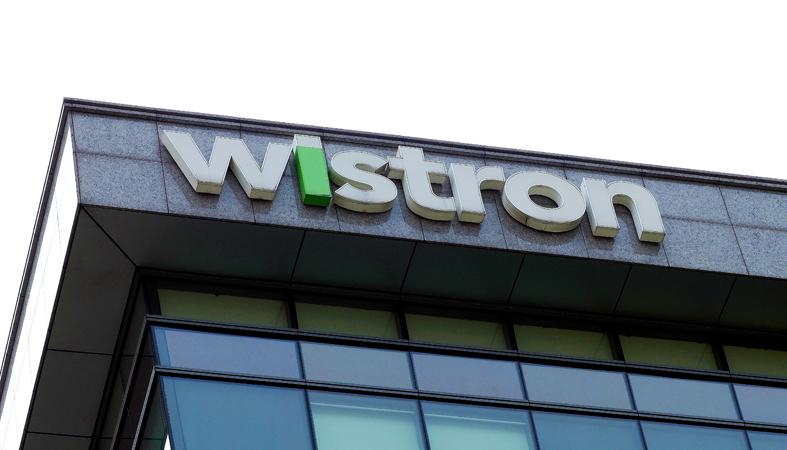A Wistron Corp (緯創) plant in India is set to restart operations, after a riot broke out at the production base spurred by a labor dispute in December last year, Indian media reported on Tuesday.
Citing Wistron Smart Devices chief executive officer David Shen (沈慶堯), the Times of India said that the company has taken steps to improve standards at its Narasapura factory in Karnataka state, and would resume operations soon.
On Dec. 12, a protest by about 2,000 workers turned violent. Employees at the factory, which assembles iPhones for Apple Inc, said that they had not been paid the wages agreed upon when they were hired.

Photo: EPA-EFE
Some protesters attempted to set fire to vehicles, Indian media reported.
The riot led to a production stoppage, causing losses of NT$100 million to NT$200 million (US$3.52 million to US$7.04 million), the company said.
Reuters at the time said that Wistron failed to maintain proper employment records of their workers, who worked 12-hour shifts at the Narasapura plant and were not paid for overtime.
An investigation report obtained by Reuters also said that three of Wistron’s human resources providers — Creative Engineers, Quess Corp and Addeco India — had contravened labor regulations.
However, the Times of India quoted Shen as saying: “All employees have been promptly and fully paid and we have implemented new hiring and payroll systems to ensure that everyone is paid correctly and provided with the correct documentation.”
“We will be delivering enhanced training programs for all workers and have put in place a new system for workers to get information and raise any concerns they might have,” Shen said, adding that the firm would accept anonymous complaints.
“We are looking forward to restarting our operations and welcoming back team members, and we thank them for their patience and support as we work through corrective actions,” he added.
Wistron employs 12,000 workers at the Narasapura factory.
Apple teams and independent auditors have over the past eight weeks been working with Wistron to implement improved processes, the Cupertino-based firm said in an e-mailed statement, adding that the Taiwanese contractor would continue to face scrutiny.
“A comprehensive set of corrective actions has now been completed and Wistron has restructured their recruiting team and enhanced training and support for workers,” Apple said. “Wistron remains on probation and we will monitor their progress closely.”
All workers at the facility would undergo a training program to ensure that they understand their rights and how to raise concerns, Apple said.
Apple representatives would remain on site to monitor new processes, it added.
Additional reporting by Bloomberg

Taiwan Semiconductor Manufacturing Co (TSMC, 台積電) yesterday said that its investment plan in Arizona is going according to schedule, following a local media report claiming that the company is planning to break ground on its third wafer fab in the US in June. In a statement, TSMC said it does not comment on market speculation, but that its investments in Arizona are proceeding well. TSMC is investing more than US$65 billion in Arizona to build three advanced wafer fabs. The first one has started production using the 4-nanometer (nm) process, while the second one would start mass production using the

A TAIWAN DEAL: TSMC is in early talks to fully operate Intel’s US semiconductor factories in a deal first raised by Trump officials, but Intel’s interest is uncertain Broadcom Inc has had informal talks with its advisers about making a bid for Intel Corp’s chip-design and marketing business, the Wall Street Journal reported, citing people familiar with the matter. Nothing has been submitted to Intel and Broadcom could decide not to pursue a deal, according to the Journal. Bloomberg News earlier reported that Taiwan Semiconductor Manufacturing Co (TSMC, 台積電) is in early talks for a controlling stake in Intel’s factories at the request of officials at US President Donald Trump’s administration, as the president looks to boost US manufacturing and maintain the country’s leadership in critical technologies. Trump officials raised the

‘SILVER LINING’: Although the news caused TSMC to fall on the local market, an analyst said that as tariffs are not set to go into effect until April, there is still time for negotiations US President Donald Trump on Tuesday said that he would likely impose tariffs on semiconductor, automobile and pharmaceutical imports of about 25 percent, with an announcement coming as soon as April 2 in a move that would represent a dramatic widening of the US leader’s trade war. “I probably will tell you that on April 2, but it’ll be in the neighborhood of 25 percent,” Trump told reporters at his Mar-a-Lago club when asked about his plan for auto tariffs. Asked about similar levies on pharmaceutical drugs and semiconductors, the president said that “it’ll be 25 percent and higher, and it’ll

CHIP BOOM: Revenue for the semiconductor industry is set to reach US$1 trillion by 2032, opening up opportunities for the chip pacakging and testing company, it said ASE Technology Holding Co (日月光投控), the world’s largest provider of outsourced semiconductor assembly and test (OSAT) services, yesterday launched a new advanced manufacturing facility in Penang, Malaysia, aiming to meet growing demand for emerging technologies such as generative artificial intelligence (AI) applications. The US$300 million facility is a critical step in expanding ASE’s global footprint, offering an alternative for customers from the US, Europe, Japan, South Korea and China to assemble and test chips outside of Taiwan amid efforts to diversify supply chains. The plant, the company’s fifth in Malaysia, is part of a strategic expansion plan that would more than triple